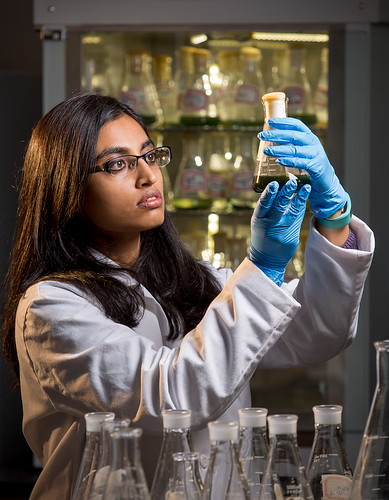
Apurba Banerjee, a doctoral candidate in the College of Family and Consumer Sciences, researches alternatives to petrochemical-based plastics.
Under the direction of her advisor, Dr. Suraj Sharma, she works to create biodegradable plastics derived from commonly found pond algae.
These plastics, called PHAs (polyhydroxyalkanoates) are actually synthesized by a species of algae (cyanobacteria) when there is a deficiency in essential nutrients such as phosphorus or nitrogen.
Banerjee explains that this research in cyanobacterial bioplastics uses carbon dioxide gas as its carbon source for production of these biodegradable plastics.
While typically referred to as a “green-house gas” that contributes significantly to global warming, carbon dioxide is used by these algae to make bioplastics that are “very worthy candidates to replace petrochemical-based products.”
“By utilizing waste carbon dioxide from industrial facilities to produce algal PHAs, not only are we reducing the cost of the raw materials,” Banerjee says, “but also recycling and reusing effluents to biosynthesize valuable biodegrable material.”
Due to an abundant supply of carbon dioxide, the process of producing PHAs is sustainable and, with algae – which are photo-autotrophic microorganisms- production of PHAs is more easily achievable than other bioplastics.”
“My research aim is to create sustainable and environmentally-friendly products that can be used in various fields,” she says. “I see the polymer we are developing as being part of anything from shampoo bottles or chip bags to parts of an airplane.”
Banerjee hopes her research ultimately contributes to creating consumable products in the biomedical field such as sutures, bandages and hernia meshes- a goal that actually led her to choose UGA as her graduate institution.
“The Polymer, Fiber, and Textiles concentration in the Department of Textiles, Merchandising and Interiors caught my attention because of its unique amalgamation of cutting edge innovation in the field of polymers with the eventual consumer-oriented applicability of the research that is being carried out in the department.”
“In the past decade, the field of sustainable, ecofriendly plastics, has been growing in leaps and bounds and I envision myself to be part of this revolutionary change,” she says.
After graduation, Banerjee plans to continue her research in the bioplastic industry with the development of efficient products for consumers.
“Since textiles is a very applied science, it is important for me to explore the real world applications and gain the resources to bring back to academia and be a well-informed educator.”
After working for a time in the bioplastics industry, Banerjee would like to return to academia to guide the next generation of scientists.
“Eventually, I would like to join academia and help mentor students in finding the right direction for their career path.”
